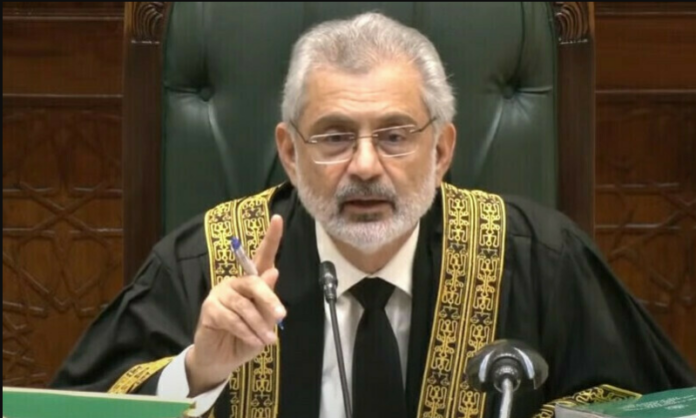Chief Justice of Pakistan Qazi Faez Isa remarked on Monday that despite having a year, PTI was unable to conduct intra-party elections. These remarks came during a Supreme Court hearing concerning the reserved seats of the Sunni Ittehad Council.
The case was heard by a full court bench of 13 Supreme Court justices, led by Chief Justice Qazi Faez Isa. The bench included Justice Syed Mansoor Ali Shah, Justice Muneeb Akhtar, Justice Yahya Afridi, Justice Ameen-ud-Din Khan, Justice Jamal Khan Mandokhail, Justice Muhammad Ali Mazhar, Justice Ayesha Malik, Justice Athar Minallah, Justice Syed Hasan Azhar Rizvi, Justice Shahid Waheed, Justice Irfan Saadat Khan, and Justice Naeem Akhtar Afghan.
At the outset, Sikander Bashir Mohmand, the Election Commission’s lawyer, began his arguments. He noted that he would need about 30 minutes to present four legal points. He highlighted that PTI had no organizational structure at the time of submitting party certificates, with Gauhar Ali Khan signing the documents, but PTI had not held intra-party elections in accordance with the law.
Justice Jamal Mandokhail inquired about where the mistake occurred. Sikander Bashir replied that Hamid Raza’s nomination papers indicated an affiliation with the Sunni Ittehad Council, but the necessary affiliation certificate was provided later. Justice Muneeb Akhtar pointed out that the certificates were invalid as PTI’s chairman had not been elected when they were submitted.
Justice Ayesha Malik emphasized that PTI’s organizational issues were long-standing, and the Election Commission could have addressed them earlier. Chief Justice Isa noted that despite multiple requests for time, PTI had failed to conduct intra-party elections within a year.
Justice Jamal Mandokhail observed that Ali Muhammad Khan’s nomination papers were blank, reflecting the broader issue of incomplete documentation among candidates. The Election Commission’s lawyer acknowledged difficulties in pronunciation and minor misunderstandings in documents.
The argument session included discussions about the inconsistencies in the submission of nomination papers and certificates, with the court emphasizing the need for proper adherence to procedural requirements. The session ended with the Attorney General Mansoor Usman presenting his arguments after a brief break.

Justice Athar Minallah, during a previous hearing, had remarked on the Election Commission’s misinterpretation of the Supreme Court’s decision, which had excluded a significant party from the election race. The court proceedings highlighted ongoing issues with PTI’s organizational structure and procedural compliance in intra-party elections.



